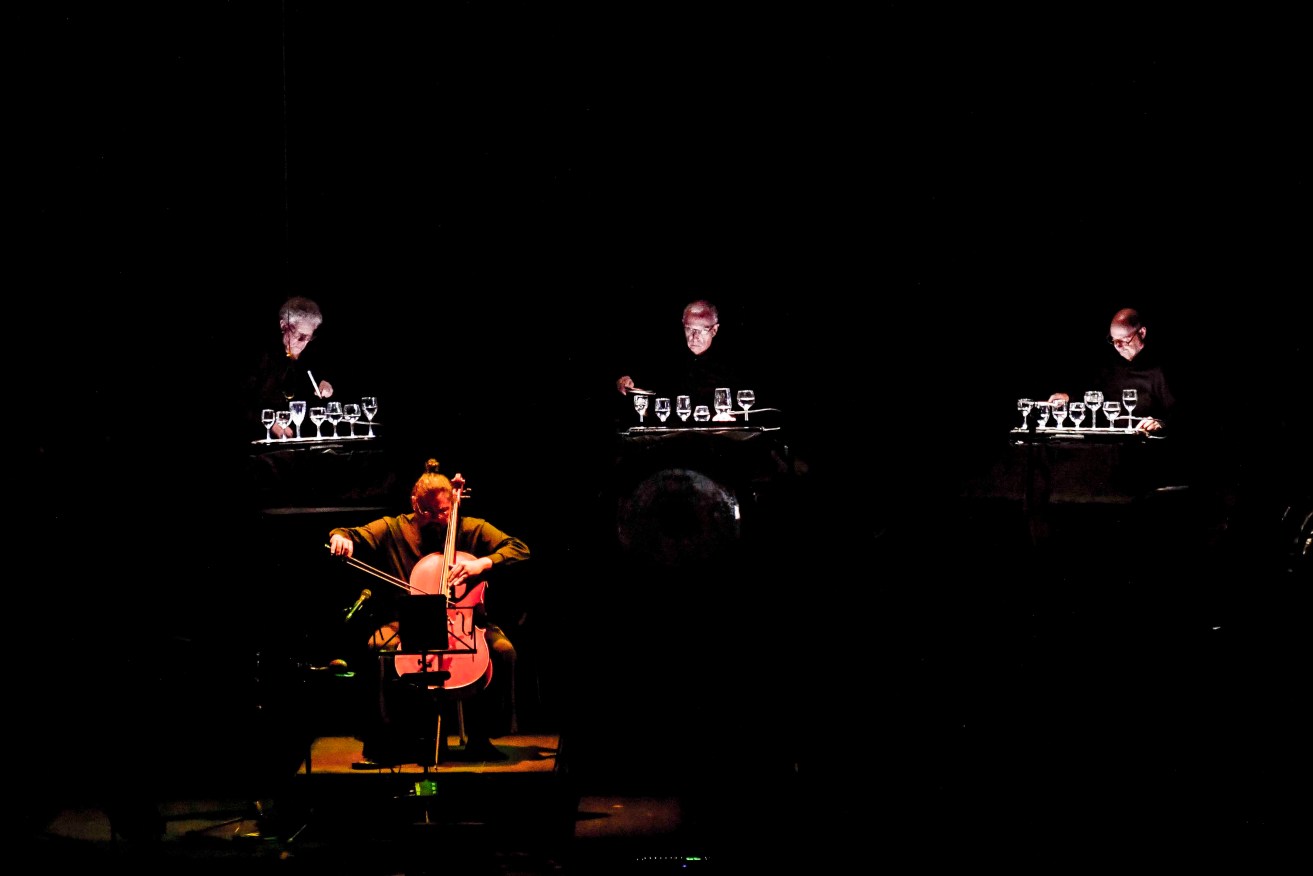Adelaide Festival review: KRONOS Five Decades
In what could well be the last time we see them, Kronos Quartet gave an astonishing account of the group’s music spanning five decades before signing off with an impassioned plea for women in Iran.


Kronos Quartet in dramatic form at the Festival Theatre on Monday. Photo: Roy VanDerVegt
With a history stretching back nearly 50 years, Kronos Quartet has built a bigger reputation, and deeper respect, than fairly much any other classical group in modern times. It all started when, as a 23-year-old, violinist David Harrington heard a piece called “Black Angels” by George Crumb playing on the radio and resolved to start a group that would explore its kind of music.
And how appropriate that his now famous group should plunge into this same fearsomely avant-garde composition half a century later to remind us of its impact. “Black Angels” truly has a wicked sting to it, and in the course of its extraordinary sonic traverse, it still registers strident notes of protest about the state of the world.
Many will have heard its opening in the movie The Exorcist without perhaps knowing its provenance. Entitled “Threnody I: Night of the Electric Insects”, it represents assault helicopters in action during the Vietnam War. Dissonances scything away at high volume create a teeth-splitting effect. A later section quotes Schubert’s “Death and the Maiden” in ghostly memory.
Here was a definitive performance of an all-defining work, with Kronos doing what they have always excelled at: executing amazing sonic effects with unmatched authority and precision, and playing with almost Zen-like concentration.
Even if you aren’t aware of its forceful anti-war messages, “Black Angels” remains quite a piece all these years later, at times becoming performance art. At its start, Harrington and his colleagues reached up to unhook their instruments from suspension lines before moving behind to strike tam-tam gongs and run their bows over crystal glasses to ethereal effect.
It’s all very theatrical, but Kronos did not indulge in any histrionics. They didn’t need to. They carefully went about their business like four wise professors. The newest addition to the group, Paul Wiancko (replacing Sunny Yang just recently), has the composure of a Tibetan priest as he plays. One could admire how distinct each musician is, being true to themselves yet able to combine with an unrivalled unity.
Aleksandra Vrebalov’s “ilektrikés rimes” (Electric Rhymes) is a response to “Black Angels” that serves as a lament for her strife-torn former homeland of Yugoslavia; having this piece come next brought out strong emotions of struggle in this program. The work begins with a single note, laden with buzzing, writhing energy before the cello plucks a solo to sound like an Arabic oud. Recorded words in old Slavonic overlay the strings, as if echoing across the centuries.
One of more than 900 pieces works that Kronos has commissioned, “ilektrikés rimes” is included in their 50 for the Future repository of music and resources – a remarkable legacy that illustrates what the group has done in charting the future of the string quartet medium.
In the second half, Australian composers Jon Rose and Hollis Taylor contributed a wonderfully cheerful piece, called “BEAK”. With film clips of a pied butcherbird in full cry on a moonlit night, its fluty slides and chirrups created a delightful dialogue with nature.
The beautifully interwoven textures of Missy Mazzoli’s “Enthusiasm Strategies” made hers a uniquely personable work. More extraordinary as an event to witness was Kronos’s playing in Penderecki’s “Quartetto per archi”: they read this from notation rolling across the screen in real-time, allowing the audience to follow every note. So brilliantly done, and so clever.
The focus of this concert then shifted to Iranian singer-songwriter and activist Mahsa Vahdat in a set of songs arranged by Sahba Aminikia. Deeply imbued in Persian folk tradition, her songs were beautiful in their impassioned simplicity. Vahdat is a most wonderful singer too, light but mellow in tone, and as finely tuned as the accompanying strings of Kronos. Very much from the heart, her lyrics spoke of the stifling of women’s lives and voices following the Islamic Revolution in 1979 in Iran.
Besides the wonders of its playing, its embrace of politics – here courtesy of Vahdat – has made Kronos a unique force in contemporary culture.
Murmurs are that the group may henceforth pull out of playing, or at least touring. With no official word as yet to that effect, its legions of ardent fans around the world will just have to wait and see.
KRONOS Five Decades with special guest Mahsa Vahdat was a one-off Adelaide Festival concert at the Festival Theatre on March 13.
Read more Adelaide Festival coverage here on InReview.




